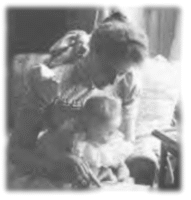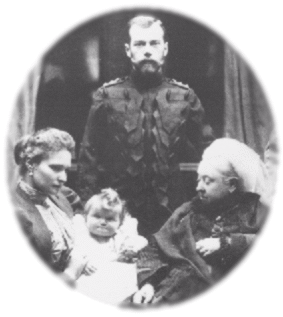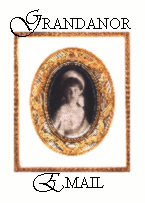

 It began on a day just like any other in 1884.
Twelve-year-old Princess Alix, still living in Windsor with the grandmother who had
taken her and her little brother Ernie in when their mother died six years before, was
slightly surprised by her elder sister Ella's engagement to Grand Duke Sergei of Russia.
She was even more surprised, and probably a little bit happy, when it was announced
that the wedding would take place in Russia. Quickly, the young princess was shipped
off to St. Petersburg to attend the fabulous wedding.
It began on a day just like any other in 1884.
Twelve-year-old Princess Alix, still living in Windsor with the grandmother who had
taken her and her little brother Ernie in when their mother died six years before, was
slightly surprised by her elder sister Ella's engagement to Grand Duke Sergei of Russia.
She was even more surprised, and probably a little bit happy, when it was announced
that the wedding would take place in Russia. Quickly, the young princess was shipped
off to St. Petersburg to attend the fabulous wedding.
The story
begins here, at the Winter Palace - the grandiose, elegant St. Petersburg home of the
tsars - where a children's ball was thrown. Shy, reticent Alix attended, as did the
young Tsarevich, Nicholas, a charming sixteen-year-old.

Between some people, a spark
instantly ignites, lighting a fire that will burn for eternity. Such was the case of
Nicky and Alicky. Before the party had died down, they had scratched their names and
the date on a glass window with the stone in Alix's ring. Delighted with Alix's
attention, a charmed Nicholas offered Alix an expensive diamond brooch. Hesitantly
she accepted it. However, a few days after, she realized that it was not a proper
thing to do. During the middle of a dance, she flushed and pressed the costly jewel
back into his hands. In disappointment, Nicholas gave the brooch to his sister
Xenia, who, innocent of its history, accepted it as a sweet offering from her brother.
Soon Alix sailed back for
England, but she left a piece of her heart back in Russia, that fairy-tale land of snow
queens and sleigh rides and white nights. And as for Nicky, he was charmed with this
minor Hessian princess.

In 1889, Alix turned seventeen, and, as a
result of her "coming out" into society the year before, took a second trip to
Russia. She stayed with her sister Ella (Grand Duchess Elizaveta) and brother-in-law
Sergei at their estate, Ilinskoe. Nicholas, of course, was delighted to hear that
Alix was visiting, and made a point to see her.
He expressed his wish to marry the princess
to his parents - the stern, enormous figure of Alexander III and dainty but headstrong
social butterfly Maria Feodorovna. Neither held the idea in high regard.
Empress Maria thought Alix looked too straight and stiff; it was "as if she had
swallowed a yardstick." She also disliked the idea of bringing a
Victorian-raised girl to the throne. Instead, she attempted to set up a match with
various princesses, including the Princess of Orleans, but Nicholas was adamant. So,
hoping that he would forget Alix as soon as possible, they sent him off to tour the world.
On April 29, 1891 (O.S.) Nicholas was
visiting Japan. As he and his friends rode merrily along in a traditional Japanese
ricksha, they were shocked to see a "madman" tearing down the street, a samurai
sword in his hand. Shouting, the Japanese lunged at Nicholas, who cried, "What,
what do you want?" The sword sliced his scalp, and policemen rushed to
restrain the lunatic.
Back home, Alix was going through life as
normal. Her sisters - Victoria, Ella, and Irene - were all married (to Lord
Battenberg, Grand Duke Sergei, and Prince Henri of Prussia respectively), and she had no
one to turn to for guidance. Her beloved father, Grand Duke Louis of Hesse, died,
and Alix's brother Ernest-Louis ("Ernie") became the new grand duke. Since
he was not married, Alix eagerly accepted the role of hostess, and the grand ducal palaces
were graced by her presence. She still loved Nicky, but refused to marry him on
account of her religion. It was tradition that every Russian noble bride become
Russian Orthodox before marriage. Alix's religion was German Lutherism. With
tears in her eyes, she had refused Nicky's offer, but thoughts of the dashing young
tsarevich kept popping up.


In 1894, the European royal
families flocked to a wedding held at Coburg Castle in Germany - and of course, Alix and
Nicholas were included. The wedding was for Alix's brother, Grand Duke Ernest, and
Princess Victoria-Melita (a.k.a. "Ducky") of Saxe-Coburg-Gotha. Mustering
up his courage, Nicholas again requested Alix's hand in marriage. This time, with
tears, protests, and then, a brilliant smile, Princess Alix accepted.

From the start, the new couple seemed to be
plagued with worries. In the summer of 1894, Alexander III's kidney began acting up,
and the imperial family moved to their estate in the Crimea, Livadia, for his health.
The doctors placed the Tsar on a strict diet, and one of the forbidden treats was
ice cream. When Alexander and his twelve-year-old daughter Olga were alone, he
begged her to get him some ice cream. Unable to refuse, Olga secretly filled a bowl
and handed it to him.
As summer changed into the bright leaves and
crisp winds of autumn, Alexander's condition suddenly worsened. Quickly, Nicholas
sent for Alix, who came at once. As there was not ample time for a first-class
ticket, the delicate Victorian princess rode third-class. This perhaps would be one
of the only times that Alix would face the realities of the Russian peasantry.
She arrived at Livadia in time to
participate in the ceremony that would make her a Russian Orthodox. She took on a
new name - Alexandra Feodorovna - and spit on the ground in a symbol of renuncing her
former faith. And just in time, too. On November 1, 1894, (NS) Tsar Alexander
III passed away with his family watching.

Alexander III was only in his grave a week
when Nicholas and Alix's wedding took place. It was held on the 26th of November
(NS), in St. Petersburg, after the imperial family arrived there to bury the tsar.
Alix, having converted to Russian Orthodoxy, was now known as "the truly believing
Grand Duchess Alexandra Feodorovna." The date happened to be on the Dowager
Empress Maria's birthday, and so a relaxation of the mourning was allowed. She
dressed in white - in stark contrast to the mourning black - and thought it sad and
unusual. Others thought it a foreboding. It was said of the new empress that
she "came behind a coffin." She expressed her thoughts to her sister
Elizaveta, in a letter on December 10:
| The ceremony in church reminded me so much
of '84, only both our fathers were missing - that was fearful - no kiss, no blessing from
either. But I cannot speak about that day nor of all the sad ceremonies before. One's
feelings you can imagine. One day in deepest mourning, lamenting a beloved one, the next
in smartest clothes being married. There cannot be a greater contrast, but it drew us more
together, if possible. |
And so, a year passed in mixed mourning and
happiness for the new Tsar and Tsaritsa. And the next November, on the 3rd, the old
guns on the Fortress of St. Peter and Paul issued one hundred and one rounds. Three
hundred meant an heir; 101 meant a grand duchess.

 "She is a big baby
weighing 10 pounds and measuring 55 centimeters. I can hardly believe it's really our
child! God what happiness! She does not look at all new-born, because she is such a big
baby with a full head of hair." "She is a big baby
weighing 10 pounds and measuring 55 centimeters. I can hardly believe it's really our
child! God what happiness! She does not look at all new-born, because she is such a big
baby with a full head of hair." ~
Nicholas' diary entry, November 3, 1895 (OS)
"You can imagine our intense happiness now that we have such a precious
little being of our own to care for and look after."
~ Alexandra to Princess Louise, December 1, 1895 (OS) |
The new parents were entranced with their
new baby girl, whom they named Olga - meaning "holy." Her official title
was "Her Imperial Highness, the Grand Duchess Olga Nikolaievna of Russia," but
the name did not suit the chubby, "splendid" baby with an "immense
head" (Queen Victoria's terms). Her full head of hair was supposed to be a sign
of good luck.
Only a few months after her birth, Nicholas
and Alexandra were due to visit France on a diplomatic trip. They refused to leave
their child in the care of nurses, and instead took her along. As she rode along
with her parents in their carriage, the crowds shouted "vive la grande duchesse"
and "vive la bebe!" An official even gave her a fancy doll and doll
clothes. She was a tiny celebrity. For the new Tsar and Tsaritsa, their life
was nearly perfect: they had a family, a home of their own (the Alexander Palace in
Tsarskoe Selo), and an enjoyable life. But in the spring of 1896 came the
coronation.

Continue to Part III - Coming Soon!

Home ~ Nicholas ~
Alexandra ~
OTMA ~
Alexei
Photo Album ~
Poetry ~
Links ~
Books ~
Credits ~
Grandanor Society ~
Webring
Mailing
Lists ~ Updates ~
Awards ~
FAQ ~ Romanov Family

© 2000 Victoria Bostwell
All rights reserved